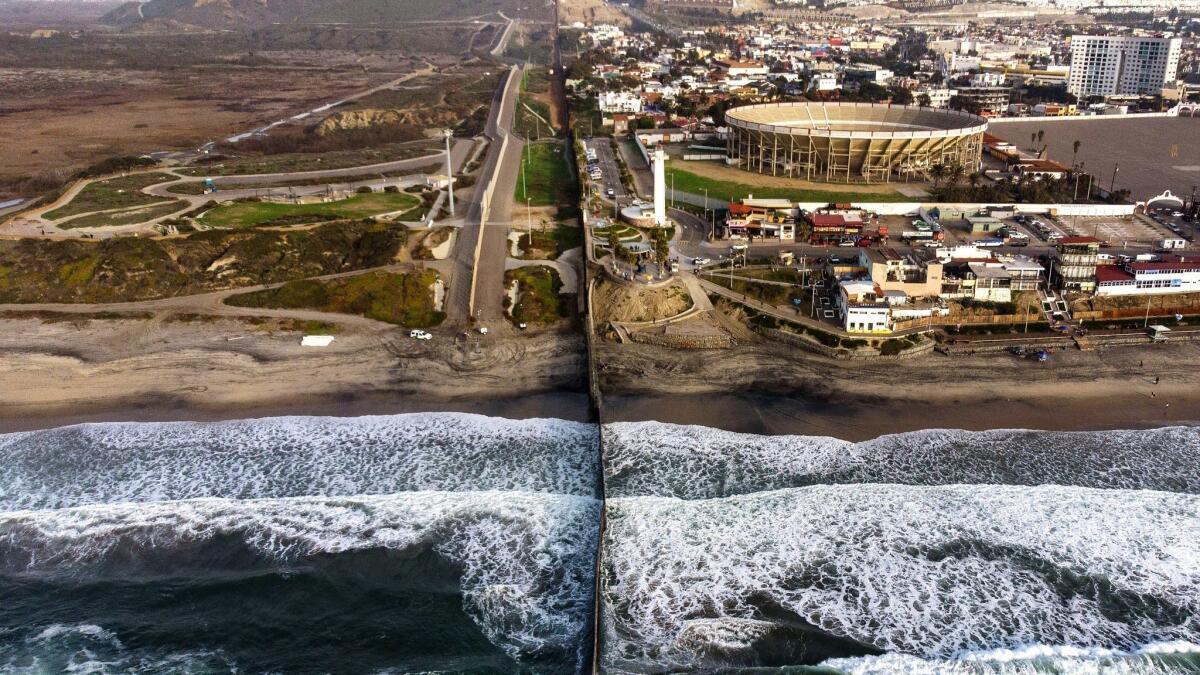Review: America’s drive west was once destiny — Now it’s a wall

- Share via
If Donald Trump had not swept to power chanting “build the wall,” someone else might well have. That’s the most chilling takeaway from Greg Grandin’s “The End of the Myth,” an essential, sweeping history of the American frontier, its end and what it has meant to our nation’s sense of itself.
Grandin takes as his starting point Frederick Jackson Turner, a historian whose ideas of the American frontier were so empowering, comprehensive and flexible that they have saturated our culture since he first presented them in 1893.
“Free land,” Turner wrote, plus “an abundance of natural resources open to a fit people, made the democratic type of society in America.” Democracy “came out of the American forest and it gained strength each time it touched a new frontier.” Americans were made by the wild and wide open spaces of the West, even as they remade them.
The mythology was intoxicating and indelible. Take Laura Ingalls Wilder’s “Little House on the Prairie,” Gene Autry’s singing cowboy or classic western films — all lead back to Turner.
If Native Americans, African Americans and the Spanish-speakers of the Southwest don’t have a place in the narratives beyond villains or minor characters, that is precisely the problem, Grandin says.
The word “frontier,” he writes, “came to suggest a cultural zone or a civilizational struggle, a way of life: a semantic change electrified by the terror and bloodshed that went along with settler expansion.” Turner’s myth conveniently omitted racism, land grabs and genocide. Grandin does not.
Grandin is a professor of history at New York University best known for 2009’s “Fordlandia,” a finalist for the Pulitzer Prize. In this book, he moves easily between historical events and tracing the political thought that accompanied and explicated them.
He sets Turner aside to begin at America’s beginning, taking the reader through the proto-United States and the nation’s formation. There were contradictions from the start. The New World was seen as “simultaneously pristine and despoiled: empty and at the same time filled with primitives begging for deliverance.” America’s “founding paradox,” as Grandin puts it, is “the promise of political freedom and the reality of racial subjugation.”
In addition to slaveholders across the South, even abolitionists failed to imagine a coequal state after the Civil War. Native Americans were massacred and betrayed and repeatedly removed from their land by state sanction.
While purchases and treaties officially moved America’s borders further west on maps, in reality, there were few actual boundaries. The frontier zone was amorphous and often bloody. Native Americans’ land might be taken over by white settlers, speculators or agents using force.
Grandin offers brutal details — then-future president Andrew Jackson “kept the skulls of Indians he killed as trophies, and his soldiers cut long strips of skin from their victims to use as bridle reins” — that illustrate the connection between violence and power. Grandin calls it “the Jacksonian cult of Caucasian democracy” — and it lives on; Jackson’s portrait now hangs in Trump’s Oval Office.
In the book, Jackson serves to illustrate a train of American thought: that we must have freedom from restriction coupled with our freedom to settle and pursue happiness. It is not an easy pairing, being as it was used to justify slavery of blacks and the persecution of Native Americans. And it also, for some, undergirded westward expansion.
Noxious undercurrents of racism and greed were directed outward toward the frontier. Grandin calls this a “safety valve” that released the pressure of the nation’s discontents. The “constant fleeing forward allowed the United States to avoid a true reckoning with its social problems, such as economic inequality, racism, crime and punishment, and violence,” Grandin writes.
We reach Turner and his profound influence midway through the book. Franklin Delano Roosevelt took a class with him at Harvard. In 1922, Arthur M. Schlesinger Sr. noted that Turner’s influence was so broad that he couldn’t capture all the places his ideas appeared. Those ideas, gently conceived, obscured brutal realities; that was part of their attraction.
With the frontier officially closed (in 1890, three years before Turner’s paper — to be fair, he was a historian), the American impulse of expansion moved outward. Grandin shows how the idea of the frontier manifested from the War of 1898 — also known as the Spanish-American War — through the World Wars, the Cold War and up through NAFTA (a bit less convincingly with more recent events — he too is a historian).
As America, and its ideology, had to draw back within its borders, the underlying issues of racism and inequality remained. “On the United States’ border with Mexico,” Grandin writes, “an obsession with fortification against what’s outside is symptomatic of trouble that exists inside.”
The growth of the KKK, its intersection with anti-immigrant legislation and the still-legal flow of Mexican laborers across the border in the 1920s was a terrible mix. Grandin writes, “white supremacists took control of the newly established U.S. Border Patrol and turned it into a vanguard of race vigilantism.” Abuses and killings on the border continued for years, but it was a still risk immigrants took. The first time they faced a wall there was after World War II, when the fencing materials from Crystal City, a Japanese internment camp in California, were repurposed on the border.
To understand Trump’s obsessive and inflammatory approach to our border with Mexico, Grandin writes, “one has to understand that the border, of the long course of its history, has effectively become the negation of the frontier.”
At the end of the frontier, there would be a reckoning or a fracturing. We are seeing the fracturing under Trump. “Trumpism is extremism turned inward, all-consuming and self-devouring,” Grandin writes. Perhaps we can summon a reckoning in the future.
::
“The End of the Myth: From the Frontier to the Border Wall in the Mind of America”
Greg Grandin
Metropolitan Books: 384 pp., $30
Kellogg is the former Books editor of The Times. She lives in Alabama.
More to Read
Sign up for our Book Club newsletter
Get the latest news, events and more from the Los Angeles Times Book Club, and help us get L.A. reading and talking.
You may occasionally receive promotional content from the Los Angeles Times.







